

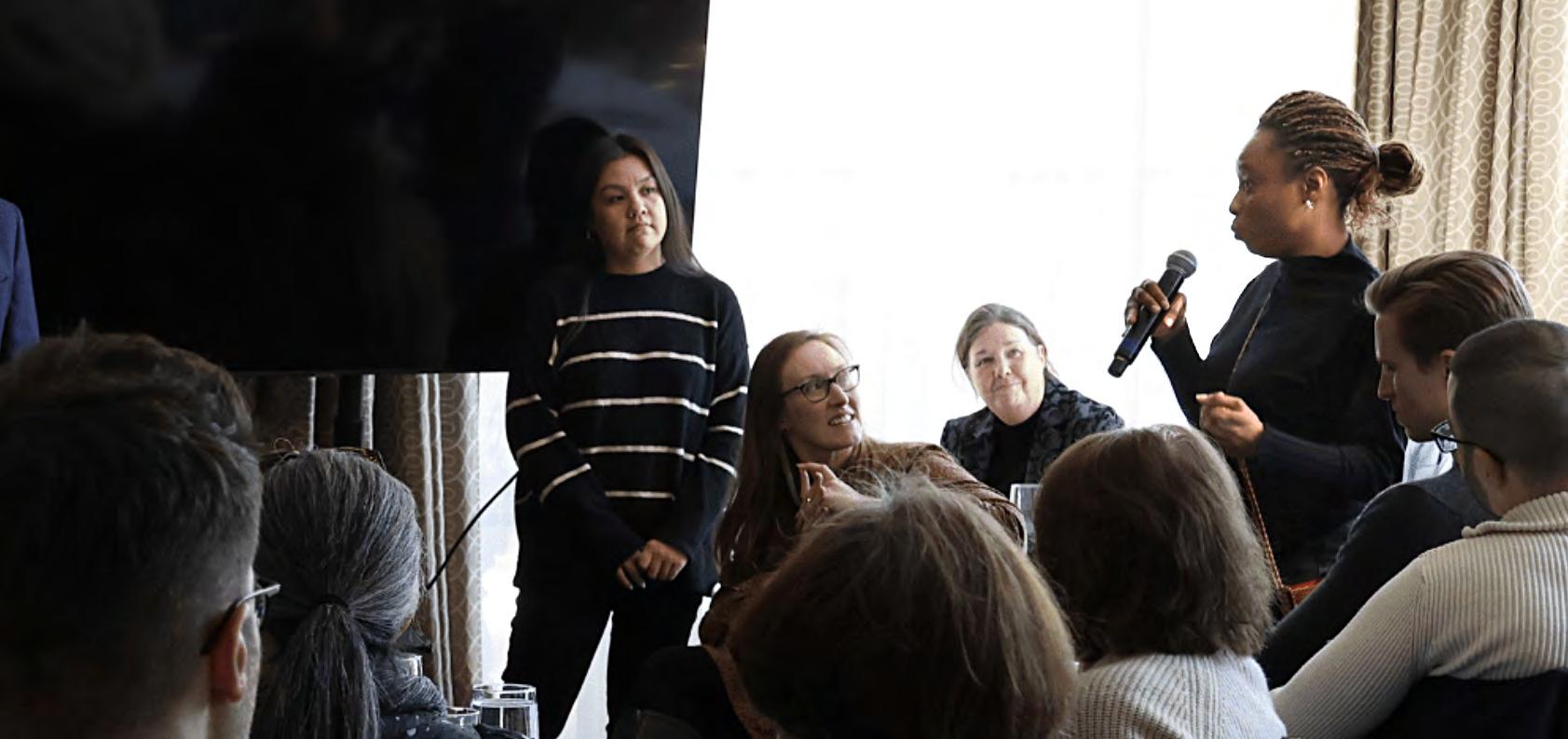
University Free Expression: then, now, and




University Free Expression: then, now, and

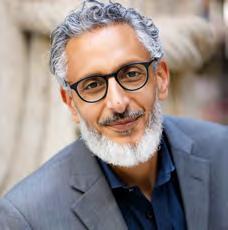
Tony Banout Executive Director
Upon our one-year anniversary, an unprecedented $100 million gift from an anonymous donor secured the Forum’s future, enabling substantial expansion of our programs and reach.
As threats to higher education and democratic discourse intensify, our work grows increasingly imperative.
The 2024-25 academic year tested the Chicago Forum’s capacity to translate principle into practice.
At a watershed moment in the history of free expression, and as disruptions and declining public trust challenged universities nationwide, we collaborated with faculty, students, and institutional leaders to advance open inquiry across campus and beyond. The scope and urgency of our programming, surge in participation and interest from the community, and unparalleled support for our mission demonstrated that rigorous, open discourse remains essential to the academic enterprise and central to the University of Chicago.
We opened the year with the publication of The Chicago Canon on Free Inquiry and Expression, a collection of foundational documents and speeches by University of Chicago leaders that captures the dynamism and evolution of Chicago’s unique tradition.
Upon our one-year anniversary, an unprecedented $100 million gift from an anonymous donor secured the Forum’s future, enabling substantial expansion of our programs and reach.
Student engagement accelerated, propelled by the establishment of our inaugural Student Board. These student leaders from across the University organized campus-wide events that fostered open dialogue around contemporary issues: artificial intelligence and law, TikTok expressive restrictions, abortion rights, vaccine debates, free speech in Hong Kong and Iran, and the U.S. presidential election, among many others. The Forum hosted more than 100 events throughout the academic year.
We continued to welcome critics and skeptics of Chicago’s tradition of free inquiry, creating venues for thoughtful yet fearless exchange with dissenting voices.
The Forum awarded $550,000 in grants to more than forty UChicago faculty members and graduate students, supporting research and course development examining the legal, cultural, and ethical dimensions of free expression.
We concluded our programming year with the Academic Freedom Institute, convening forty academic leaders from peer institutions for substantive discussions on the state and future of free inquiry.
As threats to higher education and democratic discourse intensify, our work grows increasingly imperative. We have established a robust foundation; we now build upon it with renewed purpose and expanded capability.
We welcome your continued support and collaboration in this mission.




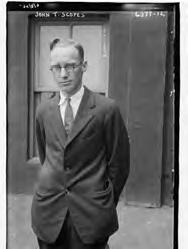
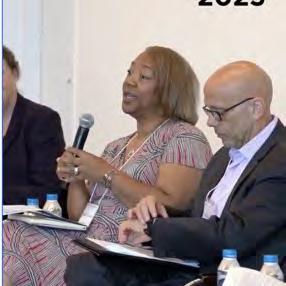
SEPTEMBER 2024
One year after the Chicago Forum’s launch, The University of Chicago receives a $100 million gift from an anonymous donor to advance its commitment to free inquiry and expression.
OCTOBER 2024
The Chicago Forum establishes its inaugural Student Board, featuring student leaders from across the University.
NOVEMBER 2024
The Student Board holds its first event, “How Did Free Speech Die in Hong Kong?”
DECEMBER 2024
The Chicago Forum awards $550,000 in grants to over forty faculty members and graduate students to support scholarly research on academic freedom and free expression.
JANUARY 2025
The Chicago Forum commemorates the tenth anniversary of the Chicago Principles by bringing together the original committee and University leaders for critical discussions on the report.
FEBRUARY 2025
The Student Board hosts Professor John Mearsheimer for a dialogue on the crisis and tensions in the Middle East, attracting more than 150 attendees.
MARCH 2025
As the state-driven crisis in higher education and free expression deepens, the Chicago Forum hosts Professors Nicole Hallett and Anjli Parrin for a discussion on urgent challenges.
APRIL 2025
Greg Lukianoff, President and CEO of the Foundation for Individual Rights and Expression, joins Professor Genevieve Lakier for a conversation on academic freedom.
MAY 2025
The Chicago Forum acknowledges the centennial of the landmark Scopes Trial, gathering an esteemed panel of scholars to explore its historical significance in an event at Breasted Hall.
JUNE 2025
Forty-two administrators from twenty-two universities convene to participate in the 2025 Academic Freedom Institute at UChicago.
The Chicago Canon on Free Inquiry and Expression, published in the fall of 2024, is a collection of foundational texts that encapsulates the University of Chicago’s longstanding tradition of free discourse.
“ The collection is a welcome reminder of the importance of clear thinking on the issue of free expression when too many universities are still trying to muddle through.”
Daniel Diermeier Chancellor of Vanderbilt University
Curated and edited by the Chicago Forum directors, the book interrogates the principles at the center of contemporary debates within higher education and society more broadly.
The documents gathered in the book include William Rainey Harper’s “Freedom of Speech” (1900), the Kalven Committee’s report on the University’s role in political and social action (1967), and Geoffrey R. Stone’s “Free Speech on Campus: A Challenge of Our Times” (2016).
Together, the writings of the Canon render the Chicago tradition as a living experiment: a spirited struggle to understand, practice, and advance open inquiry and expression.
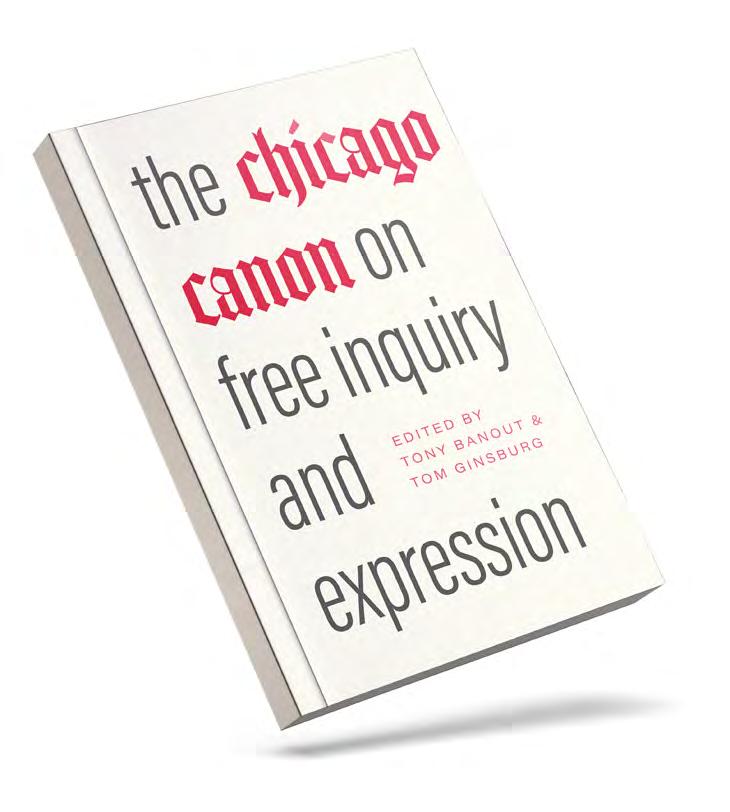
An audiobook version of the Canon was released in January 2025.
“ This vibrant, principled, inspiring compendium is a testament to the University of Chicago’s fundamental commitment to free expression. The lessons here abound for students, scholars, artists, and citizens alike.”
—Ayad Akhtar Pulitzer Prize-winning novelist and playwright
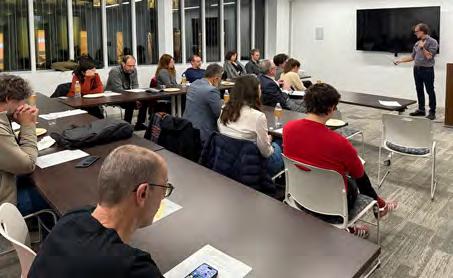
In September 2024, we cemented our presence on campus, moving into a dedicated building at 5737 South University Avenue. The space includes offices for our growing team as well as a hybrid classroom and event venue.
The new building hosted more than fortyfive Forum events over the academic year. The Chicago Forum also regularly lent its space to other campus communities, including the Center for the Study of Race, Politics & Culture, the Salon, and the Office of the Dean of the College as UChicago hosted the 2025 Ivy+ Deans Conference.
The new building hosted more than 45 Forum events over the academic year.

“A s we continue to navigate a world that increasingly demands thoughtful, courageous engagement with important issues, this gift will not only help empower our community to meet the moment with integrity and intellectual rigor, but also inspire others by our example.”
—President Paul Alivisatos
The University of Chicago is grateful to founding donors Kenneth C. Griffin, the Zell Family Foundation, and the Yagan Family Foundation for their early-stage support to the Chicago Forum.
In September 2024, one year after the Forum’s creation, an anonymous donor committed $100 million to support free inquiry and expression at the University of Chicago: the first time in history that a gift of such magnitude has been bestowed upon a university to advance these principles.
The Chicago Forum is deeply grateful to receive this gift, which has unlocked new possibilities in the fulfillment of our purpose and will sustain our growth for years to come.
This remarkable gift enables us to provide fellowships to scholars working on free expression, host events on a wider range of topics across UChicago and beyond, and collaborate with academic institutions nationally and internationally to uphold the values of rigorous inquiry and open discourse.
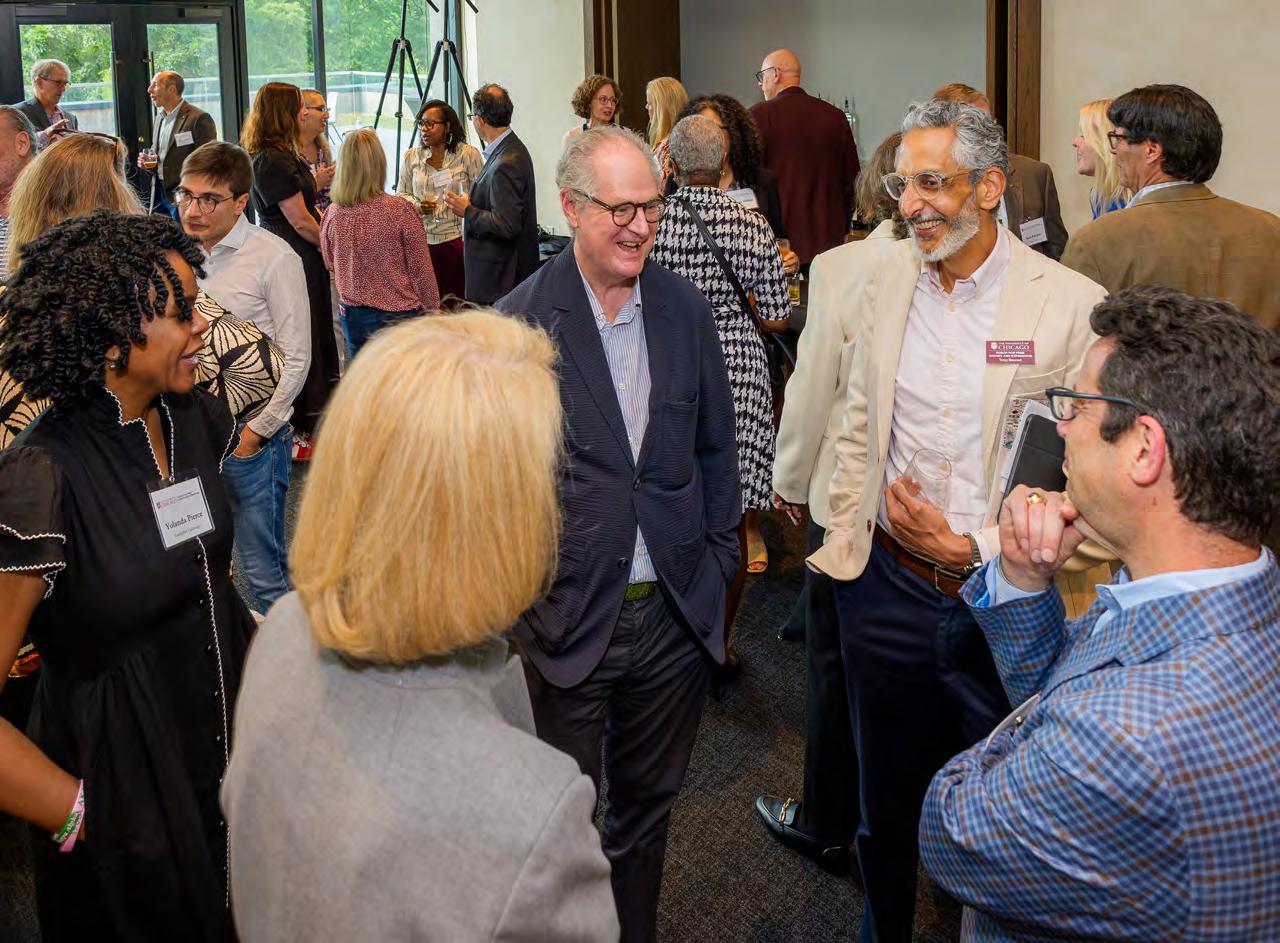
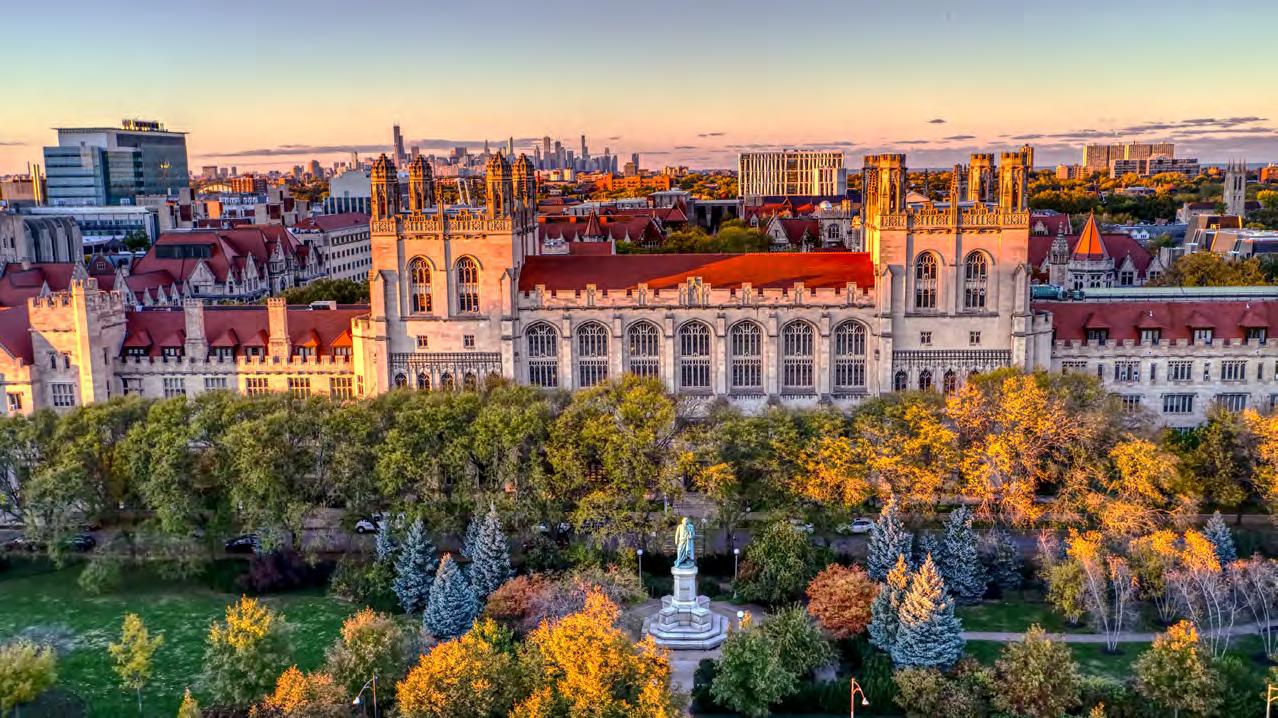
This year, the Chicago Forum selected more than forty UChicago faculty members and graduate students from among hundreds of applicants to receive grants for projects related to free inquiry and expression. The Forum awarded a total of $550,000.
Recipient scholars will use the funds to examine the intersections of free discourse with myriad issues and topics, uncovering the interplay between our principles and other fields of inquiry.
Research subjects range from online speech, university environments, academic freedom, and hate speech laws to questions of expression in ancient Chinese Buddhist traditions and the premodern Muslim world.
Course development grants will support new offerings such as “Inquiry, Conversation, and Argument,” among others.
MARY ANNE CASE , Was the Free Exercise Holding in UCLA v. Frankel the Right Deed for the Wrong Reason?
EUGENE YU JI , Interrogating Generative AI’s Role in Understanding and Shaping Free Expression: A Cognitive Models Course Initiative
ALICE KIM , Narratives of Incarceration and Justice Community Engaged Course (in collaboration with Cathy Cohen)
BENJAMIN MORGAN , Doing My Own Research: The Role of Academic Inquiry in Developing Points of View
SUNIT SINGH, The Ghost of Joseph Anton: Salman Rushdie and the Futures Lost
SUSAN STOKES , Universities in an Era of Democratic Erosion (in collaboration with Aziz Huq)
LISA WEDEEN , Free Expression in Syria after the Assad Regime
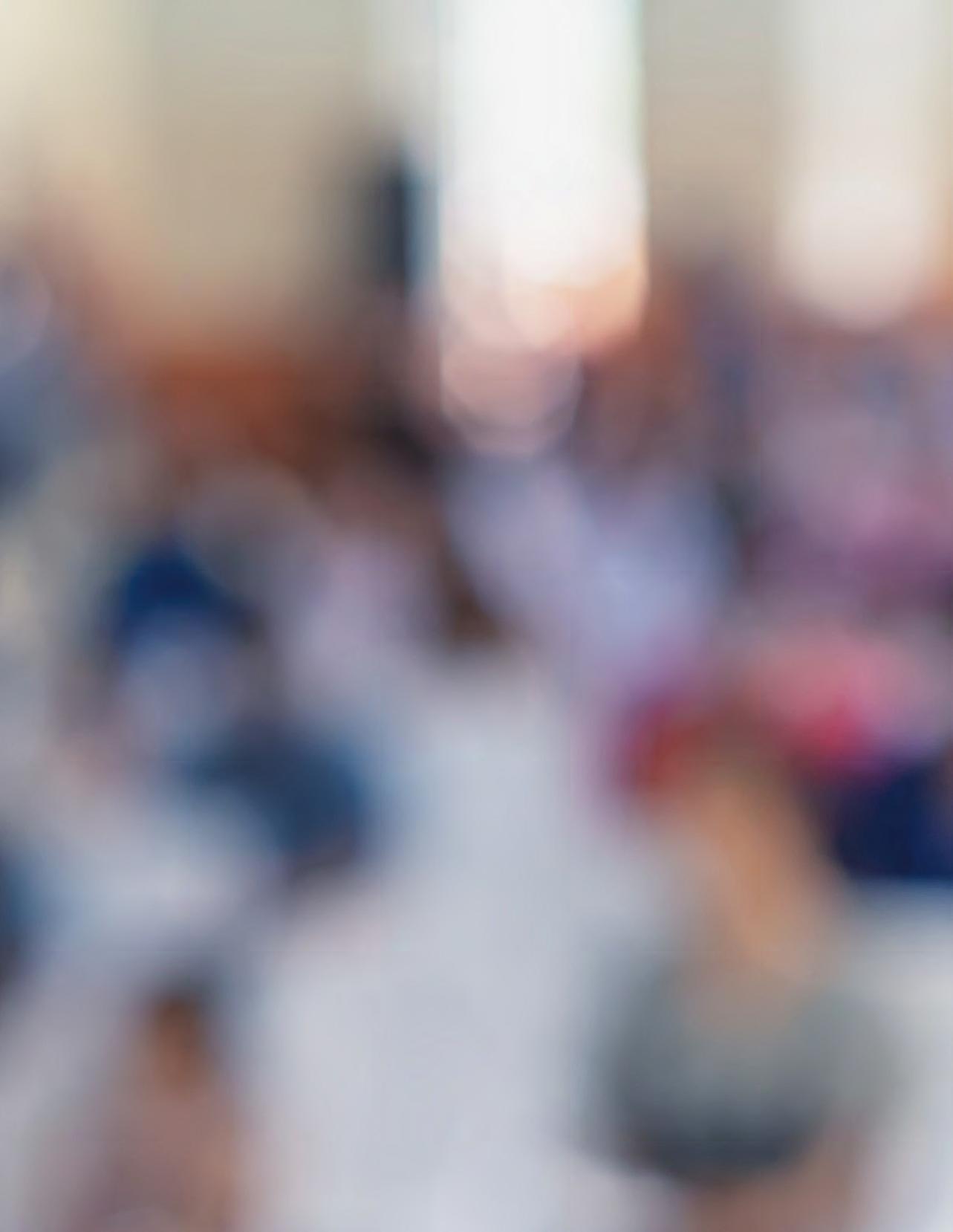
A key part of the Forum’s mission is to initiate incoming community members into the University’s tradition of free inquiry, priming new generations of scholars and students to engage thoughtfully and openly with the ideas they will encounter here and to make their own work as strong and rigorous as it may be.
While the University is renowned for the Kalven Report and the Chicago Principles, many incoming community members are unfamiliar with what these foundations truly mean. To ensure a thorough grounding in the history and tenets of free expression, we conducted more than ten focused orientation sessions for students, faculty, and staff. These sessions combined theory and practice, allowing participants to explore real-world applications through hands-on scenarios.
“A university faithful to its mission will provide enduring challenges to social values, policies, practices, and institutions. By design and by effect, it is the institution which creates discontent with the existing social arrangements and proposes new ones. In brief, a good university, like Socrates, will be upsetting.”
—The Kalven Report

“In a word, the University’s fundamental commitment is to the principle that debate or deliberation may not be suppressed because the ideas put forth are thought by some or even by most members of the University community to be offensive, unwise, immoral, or wrong-headed.”
—The Chicago Principles
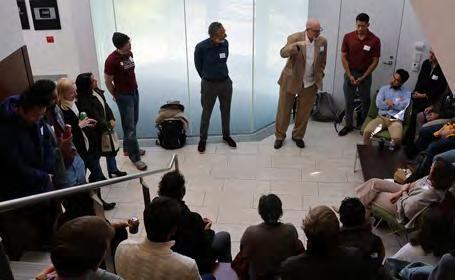
“O
ne of the great things has been the creation of the Student Board. We could not have imagined, and in retrospect [it] seems obvious, [that] if we empower our students, great things can happen. Their programming has really enriched the student environment.”
—Professor
Tom Ginsburg
The Chicago Forum established its inaugural Student Board in fall 2024. Applicants brought a wide range of perspectives, motivated by concerns such as free expression abroad, censorship in the sciences, and the suppression of speech on college campuses.
We selected twenty-three students to serve on the Board, composed of an Executive Committee and Chairs representing nearly every School and Division. The Forum supported student leaders in undertaking at least one initiative each month from January through May 2025.
In developing their ideas, we encouraged students to prioritize meaningful conversations, allowing the appropriate programming medium to evolve naturally from the topic. This approach allowed Board members to push boundaries and lead with creativity. Initiatives spanned from tabling, events, op-ed writing, and workshops to art installations.
The Executive Committee provided overarching guidance, ensuring that all programming aligned with the Chicago Forum’s mission, and offered logistical support to help the Chairs bring their ideas to fruition.

“ It has been among the most rewarding work I’ve done in my time here, and I know I will look back on it fondly long after I graduate.”
—Executive Committee Member
“Serving on the [Board] has been one of the highlights of my College experience.”
—College Co-Chair

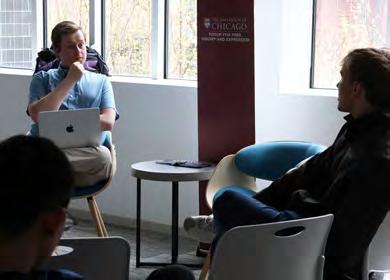
“ I ’ve enjoyed and appreciated the opportunities that the Chicago Forum has afforded us. It’s been a fantastic experience.”
—Graduate Student Co-Chair
More than fifty student Committee Members supported the Board’s efforts. Many embraced the opportunity to develop their own events and programming.
At the end of the academic year, the Chicago Forum conducted a survey to gain insight into students’ learning and experiences. Here are the major findings:
Gained professional skills
Satisfied with the Student Board’s processes
Satisfied with topics discussed at Chicago Forum events
Satisfied with the Student Board’s work

The Chicago Forum hosted more than 100 events throughout the 2024-25 academic year, connecting members of the University community with distinguished guests from beyond campus.
These gatherings fostered vibrant discourse on a wide range of contemporary topics, including artificial intelligence and the law, free speech in Hong Kong, student disciplinary practices, the real-world application of the Chicago Principles, ongoing threats to higher education, and the complexities of free expression in medicine and psychotherapy.
The Forum’s events fell into three categories:
Chicago Forum-Led Events
Student Board-Led Events
Co-Sponsored Events
The Chicago Forum began the 2024-25 academic year with the “What Might Peace Look Like?” series, an exploration of the ongoing conflict in the Middle East.
The first event featured Salam Fayyad, former Prime Minister of the Palestinian Authority, who provided insight into the origins of the Israel-Palestine conflict and navigated potential pathways to peace. The session included an interactive exercise led by Chicago Forum Faculty Advisor and behavioral scientist Professor Nicholas Epley, who encouraged attendees to engage in thoughtful, empathybased conversations.
The series continued with a talk by Professor Arnon Hershkovitz of Tel Aviv University, who discussed the vital work of the Hostages and Missing Families Forum.
Professor Jennifer Brick Murtazashvili from the University of Pittsburgh and Professor Musa al-Gharbi from Stony Brook University joined us for the final event in the series, which explored compassion and open dialogue as tools to bridge historical divides.


Throughout the year, the Chicago Forum welcomed skeptics and critical voices, inspiring lively debate on the efficacy of our foundational principles.
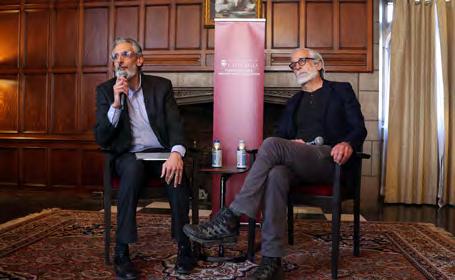

Throughout the year, the Chicago Forum welcomed skeptics and critical voices, inspiring lively debate on the efficacy of our foundational principles.
Journalist Jamie Kalven, a prominent critic of the University’s application of the Kalven Report, brought a unique perspective as the son of First Amendment scholar Harry Kalven, Jr., who chaired the committee that wrote it. In conversation with Forum Executive Director Tony Banout, Kalven articulated his concern that institutional neutrality can hamper collective response to societal threats.
The Forum also hosted an exchange between Northwestern Professor Eli Finkel, Professor Geoffrey Stone, and Edward H. Levi Distinguished Service Professor of Law. Finkel, who critiqued the Chicago Principles in a Chicago Tribune opinion piece published last year, presented his case for an alternative framework. Stone, who chaired the committee that drafted the Chicago Principles, responded with a forceful defense, arguing that Finkel’s proposed reforms risked enabling censorship and concentrating dangerous authority in administrative hands.
Sustained attacks on higher education, from threats and detentions of foreign students to widespread funding cuts, have defined this academic year. The Chicago Forum hosted two major events to discuss the implications.
On March 28, we held a conversation with Professor Nicole Hallett, Director of the Immigrants’ Rights Clinic, and Professor Anjli Parrin, Director of the Global Human Rights Clinic. They offered insights into the state’s role in driving the crisis and described the ripple effect on free expression and other fundamental rights across the country.
“And the aspiration of the principles is... for the University to make clear that we are deeply connected to this concept of free and open academic and political and social discourse.”
—Professor Geoffrey Stone
On May 20, we presented a panel featuring former UChicago President Hanna Holborn Gray, Deputy Dean of the Arts & Humanities and Associate Professor of English Eric Slauter, and Professor of Astronomy and Astrophysics Wendy Freedman. Together, they discussed the wide-ranging impact of recent government actions on research and academia.
Both events, limited to the UChicago community, operated under Chatham House Rules to encourage candid discussion.

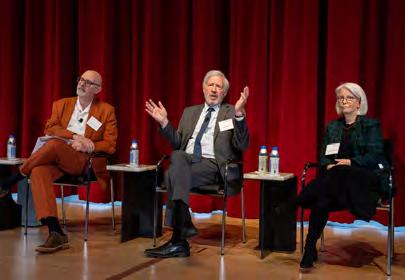
The Forum marked a significant milestone with “The Chicago Principles at Ten Years: Free Expression Then, Now, and Tomorrow.” This day-long symposium commemorated the tenth anniversary of the “Report of the Committee on Freedom of Expression,” known as the Chicago Principles.
Since their inception, the Chicago Principles have served as a lodestar to more than 100 colleges and universities seeking to strengthen free inquiry and expression within their communities. This event examined how the Principles have weathered a decade of turbulence around the question of academic freedom.
Since their inception, the Chicago Principles have served as a lodestar to more than 100 colleges and universities seeking to strengthen free inquiry and expression within their communities.
President Paul Alivisatos delivered the keynote address, analyzing the current crisis facing universities and reaffirming UChicago’s commitment to free expression.
Faculty Director Tom Ginsburg led a conversation with the committee members who drafted the Chicago Principles: Professors Geoffrey R. Stone, Marianne Bertrand, Kenneth W. Warren, Amanda Woodward, and Columbia University Provost Angela V. Olinto (former UChicago Dean of the Physical Sciences Division and member of the committee)



During lunch, Princeton Professor and New York Times columnist Zeynep Tufekci joined UChicago Professor Nick Feamster to explore the challenges of free expression in emerging technologies.
The summit concluded with a panel examining contemporary threats to and future directions for the Chicago Principles. Professors Adam Green, David Keith, Rochona Majumdar, and Deborah Nelson parsed these questions, with Professor Ethan Bueno de Mesquita moderating.
The Chicago Forum celebrated the 100th anniversary of the Scopes Trial with a panel evaluating its enduring implications for academic freedom. Pulitzer Prize-winning historian Edward J. Larson of Pepperdine University joined UChicago Professors William Schultz and Michael Rossi for the May 13 discussion, moderated by Faculty Advisor Peggy Mason.
“ I enjoyed the various perspectives—especially those of the scientist and the theologian.”
—Attendee
The panelists discussed the trial’s ongoing influence in shaping contemporary debates about curricula, scientific inquiry, and the boundaries of free expression in education.
“ Every side, they all claimed victory... They all got richer... They all attracted more followers... They made it a bigger issue… Maybe society lost.”
Edward J. Larson (on who won the Scopes Trial)
The Chicago Forum Student Board organized more than fifty events throughout the 2024-25 academic year, sparking conversations on niche topics and empowering students to share their perspectives in open and welcoming environments.
Student Board members owned each event from concept to execution. They coordinated with panelists, served as moderators, designed marketing campaigns, and managed logistics. These experiences built confidence and provided invaluable opportunities to develop and refine entrepreneurial skills.
The Student Board organized a series of peer dinner conversations, inviting students from various schools to gather over a meal and discuss topics such as immigration policies, defense, and tariffs.
The College Committee also hosted monthly dinner sessions with faculty, bringing in UChicago professors like Robert Pape and Agnes Callard to engage directly with students in an informal, lowpressure environment.
The Student Board made the intersection of technology and free expression a central focus of programming this year.
Members of the College Committee first broached the topic, hosting a conversation with Professors Nick Feamster and Molly Offer-Westort, who examined internet censorship and content moderation. Later, the Committee invited Stanford University’s Evelyn Douek and Jacob Braun of The Harris School to analyze the ramifications of potential TikTok restrictions for digital speech rights.
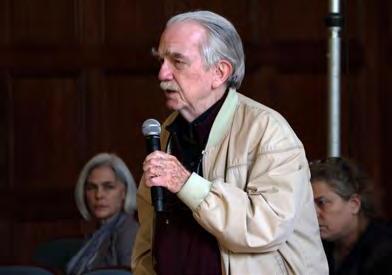
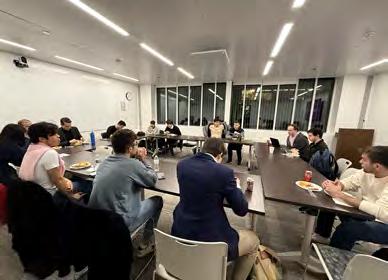
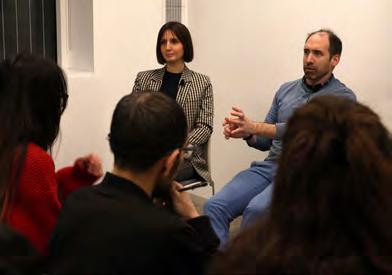

The Law School Committee organized a conversation between Jack Kieffaber and Professor William Baude, drawing on Kieffaber’s 2024 paper, “Predictability, AI, and Judicial Futurism.” The two scrutinized the mounting impact of artificial intelligence on jurisprudence.
In response to increased student interest in these issues, the Student Board will launch a dedicated committee to lead programming on AI, technology, and free expression in the 2025-26 academic year.
Beginning with “How Did Free Speech Die in Hong Kong?”, the inaugural event organized by the Student Board, global free expression emerged as another major theme of the year’s programming.
Featuring activists Frances Hui and Anna Kwok, along with Professors Michael Davis and Victoria Hui, the event surveyed the state of free speech in Hong Kong and explored the measures the government has adopted to silence critics.
The Student Board later hosted a virtual conversation with renowned Iranian human rights lawyer and activist Nasrin Sotoudeh, who discussed the suppression of political dissent in her country.
The Student Board will launch a dedicated committee to organize events that address free expression around the world next year.


The Student Board hosted several discussions examining UChicago’s approach to free inquiry and expression through a critical lens.
In January, a panel of student leaders from across campus shared their experiences at UChicago and advocated for enhanced efforts from the University to create a more open environment.
Embracing the spirit of open dialogue, the College Committee hosted a Q&A with Professor Geoffrey Stone. Students posed questions about the Chicago Principles, leading to a dynamic and thoughtful exchange.
Various student-led events addressed the state of healthcare in the United States.
The Pritzker School of Medicine Committee held monthly dinners on the subject, bringing students and professors together to engage in meaningful conversations.
In May, students convened a robust panel of UChicago professors—Matthew Notowidigdo, Joseph Dov Bruch, Elbert Huang, Ream Qato, and Colleen M. Grogan—to explore the financialization of healthcare.
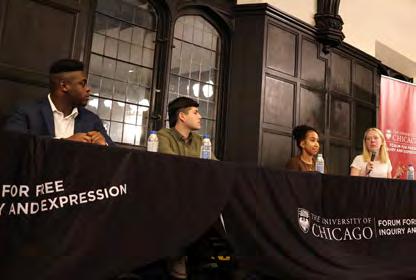

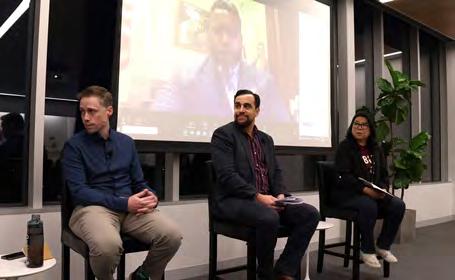
The 2024 U.S. presidential election was a recurrent theme for student organizers. From analyzing the election results to examining voter behavior, events provided an open space to discuss the direction of the country and debate the virtues of the candidates.
Across a constellation of initiatives, student committees explored art as an instrument of free expression. These ventures created vibrant spaces for critical discussion and demonstrated how art can challenge assumptions, foster dialogue, and strengthen a community’s commitment to the free exchange of ideas.
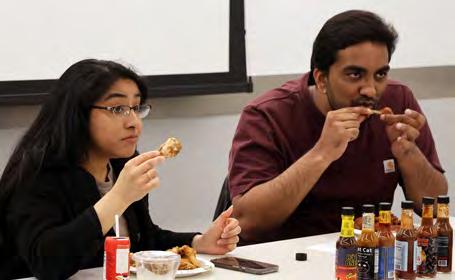
These ventures created vibrant spaces for critical discussion and demonstrated how art can challenge assumptions, foster dialogue, and strengthen a community’s commitment to the free exchange of ideas.
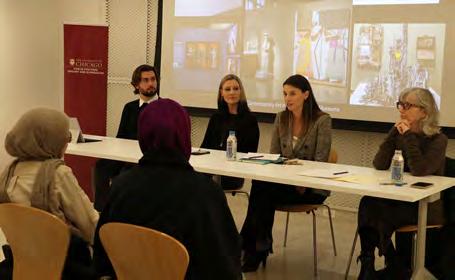


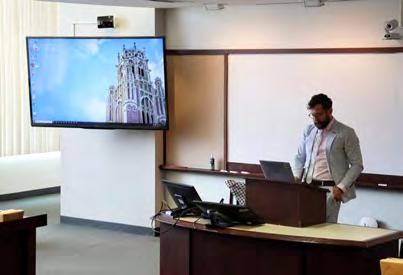
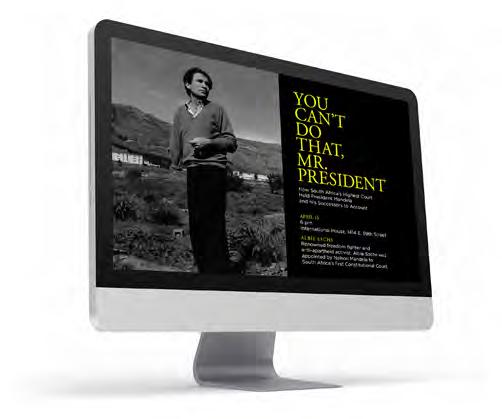
The Chicago Forum co-sponsored several events in collaboration with other centers across campus.
In partnership with the Pozen Family Center for Human Rights, we co-sponsored a talk featuring Albie Sachs, renowned South African freedom fighter and anti-apartheid activist.
We collaborated with the Science Communication & Public Discourse minor to present an event with historian Alice Dreger.
As part of our ongoing partnership with the Law School, we brought several esteemed legal scholars to campus for talks, including Ata Hindi, Tyrell Haberkorn, and Associate Justice Goodwin H. Liu.
In March, we co-sponsored “Freedoms of Speech: Anthropological Perspectives” with the Center for the Study of Communication and Society. This one-day conference convened leading anthropologists to present their scholarly research. Animated interdisciplinary discussions followed.
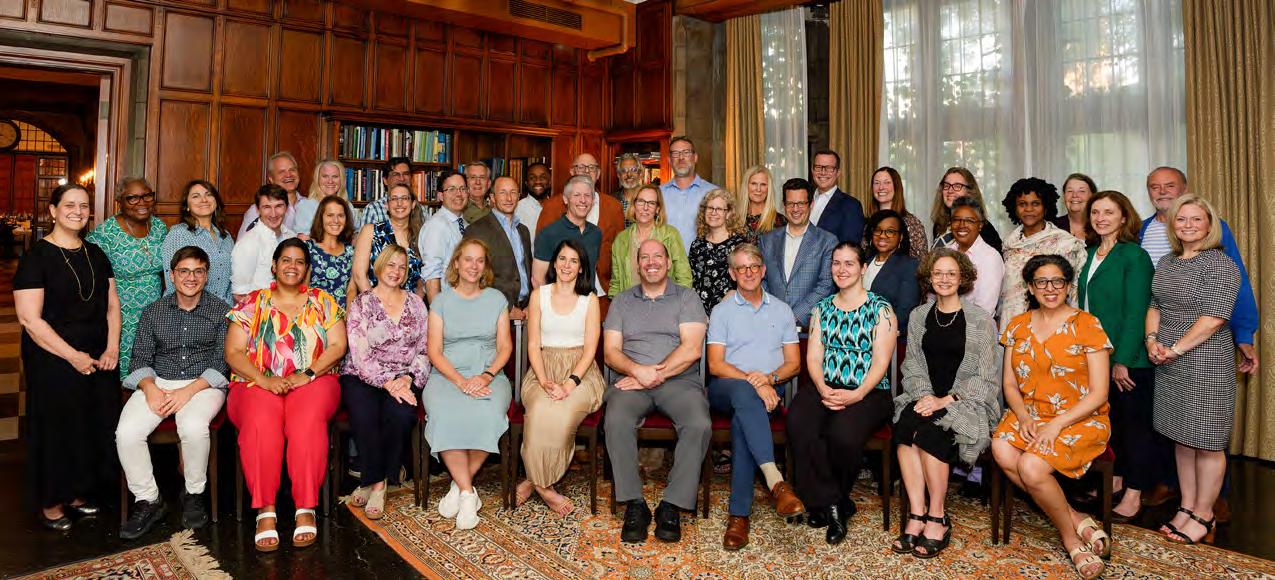
The 2025 Academic Freedom Institute brought together forty-two academic leaders from twenty-two institutions for panels and intensive workshops on protecting academic freedom. Over two-and-a-half days, participants developed practical frameworks tailored to their institutions’ specific challenges, moving beyond theory to actionable strategies for defending open inquiry.
Participants derived tangible value from the experience, according to a post-Institute survey.
“ This was one of the best programs I have ever attended! Everything was so well planned and executed. I also loved the diversity of the attendees (including some folks from Canada!). This diversity led to much richer discussions.”
—AFI 2025 Participant
84%
claimed that they were really satisfied with the program.
78%
said that they left feeling equipped to further academic freedom and free expression at their academic institution.
78%
said that they were likely to recommend attending the program to other academic colleagues from and outside their institutions.

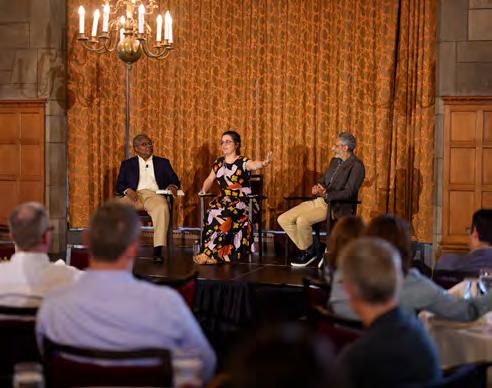
Austin Peay State University
Ball State University
Baylor University
College of Charleston
Cornell University
Dartmouth College
DePaul University
Georgetown University
Harvard University
Michigan State University
Occidental College
Purdue University Northwest
Rutgers University
Stanford University
Stetson University
University of British Columbia Okanagan
University of North Carolina
University of North Carolina System
University of Toronto
Vanderbilt University
Virginia Tech

The Chicago Forum engages regularly with higher education institutions and academic leaders to advance freedom of expression in the United States and abroad.
This crucial outward-looking involvement in the free expression community includes external visits, presentations, workshops, talks, and panel discussions.
In June, the Chicago Forum convened seventeen faculty members from thirteen institutions, including Princeton, Yale, Harvard, Georgetown, University of Pennsylvania, and the University of California, Berkeley, for an informal gathering in New York. The exchange between attendees, all of whom are pursuing academic freedom and free expression initiatives on their own campuses, yielded strategies to collectively identify and respond to threats to these principles, both internal and external.
The exchange between attendees, all of whom are pursuing academic freedom and free expression initiatives on their own campuses, yielded strategies to collectively identify and respond to threats to these principles, both internal and external.
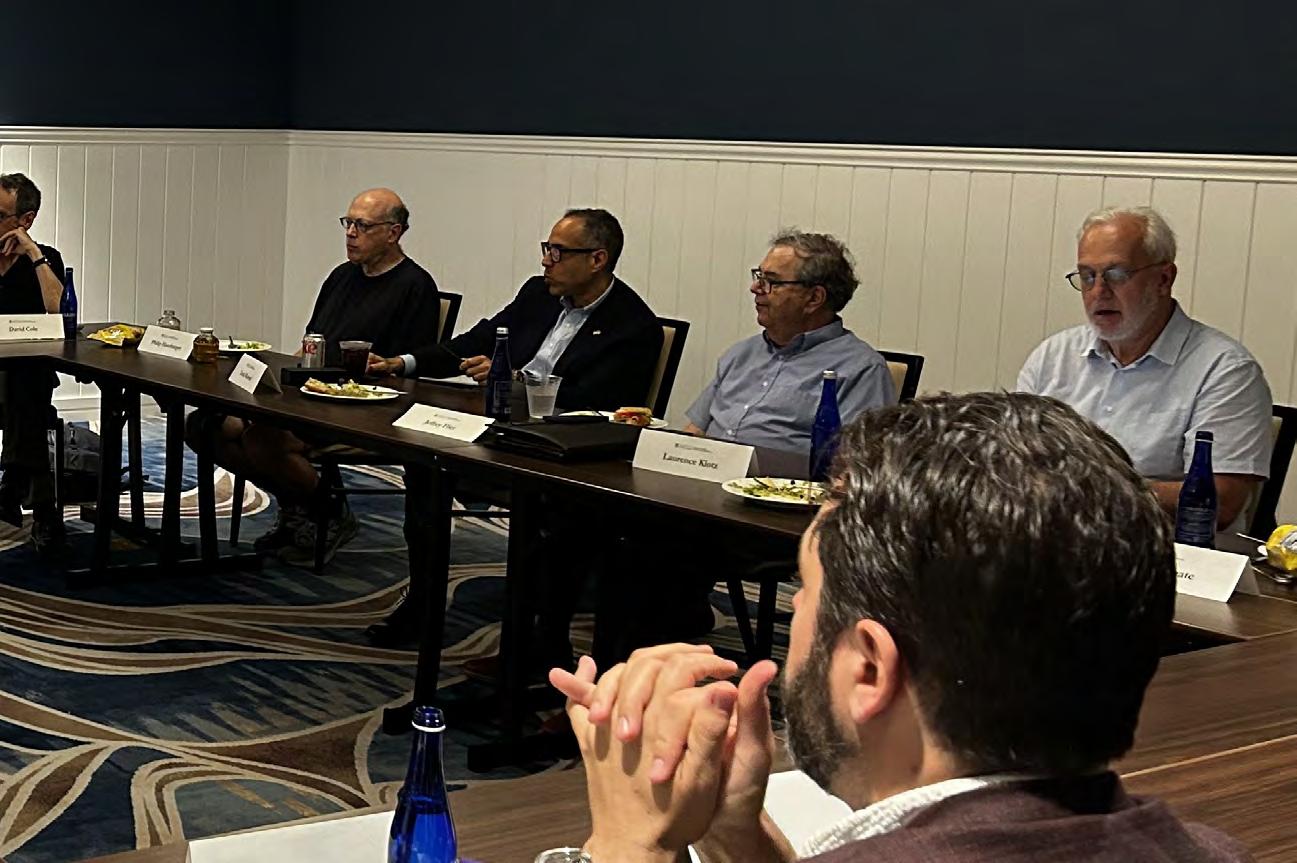
In March, Professors Tom Ginsburg and Brian Soucek, a law professor at the University of California, Davis, explored the concept of institutional neutrality in a virtual webinar organized by the National Center for Free Speech and Civic Engagement at the University of California.


Throughout the 2024-25 academic year, the Chicago Forum and its staff were featured in the media on more than forty occasions. Sources included major, local, and topical news outlets as well as university publications. The Chicago Forum was featured most prominently in UChicago News, Entitled (podcast), The Chicago Maroon, The Chronicle of Higher Education, Inside Higher Ed, The New York Times, and The Wall Street Journal.








The Chicago Forum grew across all social media platforms this year. We also expanded our social footprint, joining Bluesky and launching a bi-monthly newsletter that now serves more than 5,000 subscribers.
The Chicago Forum continues to publicize and share our views over social media. Follow us on any and all of the following!
October 2024
November 2024
° What Might Peace Look Like? A Conversation with Former Prime Minister of the Palestinian Authority, Professor Salam Fayyad
° What Might Peace Look Like? Rebuilding a Better Society: Hostages Square as Israel’s Ground Zero
° Colloquium on Free Inquiry and Diversity
° What Might Peace Look Like? A Conversation with Professor Jennifer Brick Murtazashvili of the University of Pittsburgh
° H ow Did Free Speech Die in Hong Kong?
° Is There Hope for Peace in the Holy Land?
° Free Expression Inside and Outside the Ivory Tower: A Litigator’s Perspective with Jonathan Mitchell
° G overnance or Collapse? Reflections on Turkey’s Counter-Terrorism Law and Practice featuring Professor Kerem Gülay of Koç Law School
° Academic Freedom in Europe: Discussion with Jan Komarek
° Exploring Academic Freedom with Professor Rabban: From Professional Norm to Constitutional Right
° A Conversation with Garrett Ziegler
January 2025
° Free Speech: Necessary or Conservative Propaganda?
° President Hanna Holborn Gray on Free Expression: A Unique University of Chicago Historical Tradition
° A N o-Nonsense Book Talk on Campus Free Speech with Professor Cass R. Sunstein
° Future of Tech and AI: Online Speech and Content Moderation
° Whistleblowing into the Wind with Alice Dreger
° Lunch and Learn with Alice Dreger
° G ive Your Inauguration Speech
° Intellectual Speed-Dating Event for Students
° A U Chicago Faculty Discussion on Divestment
° Dinner at the Chicago Forum: What Should We Expect of Healthcare?
° The Chicago Principles at Ten Years: University Free Expression Then, Now, and Tomorrow
February 2025
° Race and Gender in America: Unpacking the 2024 Presidential Election
° A Roundtable Discussion on Birthright Citizenship with Professor Michael D. Ramsey
° A Roundtable Discussion on Birthright Citizenship with Professor John Eastman
March 2025
° A Conversation About the 14th Amendment and Birthright Citizenship with Professor Nicole Hallett and Professor Genevieve Lakier
° B ooth Inauguration Discussion Dinner at the Chicago Forum
° A Conversation on Free Speech with Associate Justice Goodwin H. Liu
° Pritzker Perspectives Dinner
° The Unfinished Business of the Kalven Report with Jamie Kalven
° Student Evictions and Disruptive Conduct: Has the University Gone Too Far?
° Israel and Nuclear Weapons: A Talk with Professor John Mearsheimer
° Dinner at the Chicago Forum: What is the Role of the United States in the World?
° O n Law, Speech, and Watermelons
° AI and the Law: A Discussion with Jack Kieffaber and Professor William Baude
° D ueling Perspectives: Is Institutional Neutrality Necessary for Academic Freedom?
° The Imprisoned Lawyer: A Conversation from Iran with Nasrin Sotoudeh
° Freedoms of Speech: Anthropological Perspectives
° Pritzker Perspectives Dinner
° Dinner at the Chicago Forum with Professor Agnes Callard: Socrates and Speech
° Intellectual Speed-Dating Event
° The State-Induced Crisis in Higher Education: A Conversation on the Government’s Recent Actions
° U ninhibited Debate: How UChicago Shaped Free Expression Discourse
April 2025
° What Should UChicago Housing Look Like?
° A Conversation on Academic Freedom with Professor Amy Wax and Professor Geoffrey Stone
° Free Inquiry in Medicine
° Donald Trump, Civil Liberties, and Civil Society: Lessons from the First Time Around with David Cole
° A B ook Club with Professor Ilya Shapiro
° The Chicago Principles and Contemporary Challenges: Self-Defeating or Foundational for Academic Freedom?
° Let’s Talk About It: Booth Discussion Dinner
° Abortion and Free Speech: A Historical and Contemporary Perspective
° Intellectual Speed-Dating: The AI Special
May 2025
° Curating Curiosity: Navigating Free Inquiry and Expression in Museum Exhibits
° From Field to Performance: Exploring Soundscape in Research, Technology, and Artistic Practice
° You Can’t Do That, Mr. President: Albie Sachs on How South Africa’s Highest Court Held President Mandela and His Successors to Account
° Film Night: Gattaca and the Ethics of Genetic Engineering
° TikTok Ban: Balancing the First Amendment and National Security
° The Ongoing Struggle for Puerto Rican Independence
° FIRE President and CEO Greg Lukianoff on Free Speech and Current Headwinds
° Academic Freedom in the Era of Trump: A Chicago Forum Conversation with Greg Lukianoff of FIRE and Genevieve Lakier of the Law School and UChicago AAUP
° Should Stand-up Comedy Have Boundaries?
° H ot Ones with a Moderate
° Dinner at the Chicago Forum: Will Americans Soon Miss the Liberal International Order? with Robert Pape
° A Screening of Three Chaplains
° Overthrowing Democracy: Lèse Majesté and the Judiciary in Thailand featuring Professor Tyrell Haberkorn of the University of Wisconsin
° Free Speech on Trial: Professor Geoffrey Stone and the Chicago Principles
° Turning Theory into Practice: Free Expression at UChicago
° Self-Censorship in the Classroom
° Intellectual Speed-Dating Event: Year-End Finale
° S peaking the Unspeakable: Should There Be Limits on What Can Be Said in Psychotherapy or on Campus?
° The Edges of Expression: A Conversation with Professor Jeffrey Kosky
° M onkey Trials and Modern Truths: Revisiting the Scopes Trial 100 Years Later
° The First 100 Days of the Trump Administration: A Discussion
° Vaxxed or Vexed: Unpacking the Flu Vaccine Conversation
° The State-Induced Crisis in Higher Education: A Conversation with Hanna Holborn Gray, Wendy Freedman, and Eric Slauter
° The Business of Care: Navigating Healthcare in a Financialized Era
June 2025
° Academic Freedom Institute 2025